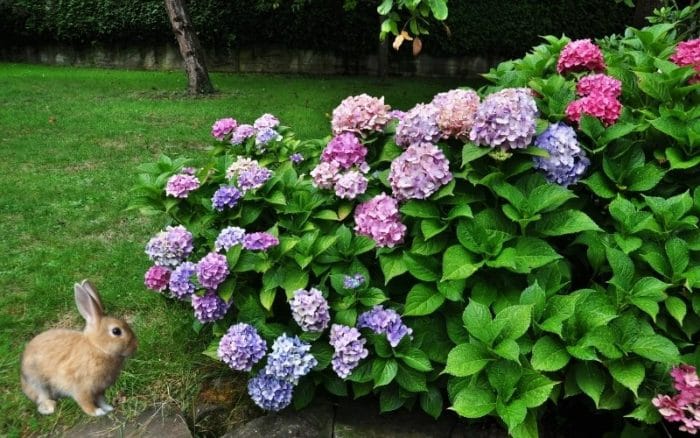Hydrangeas, with their vibrant blooms and lush foliage, are a popular addition to many gardens. However, these ornamental plants can pose a significant health risk to our furry friends, rabbits. Understanding the potential toxicity of hydrangeas to rabbits is crucial for responsible pet ownership and ensuring the well-being of these beloved companions.
This comprehensive guide delves into the complexities of hydrangea ingestion in rabbits, exploring the toxic components, clinical signs, treatment options, and preventive measures. By equipping ourselves with this knowledge, we can effectively safeguard our rabbits from the potential dangers associated with these plants.
Toxicity of Hydrangeas to Rabbits
Hydrangeas, popular ornamental shrubs, contain toxic components that can be harmful to rabbits if ingested. These components include cyanogenic glycosides, which release cyanide when metabolized, and saponins, which can irritate the digestive tract.
Severity of Hydrangea Poisoning in Rabbits
The severity of hydrangea poisoning in rabbits depends on the amount consumed and the individual rabbit’s sensitivity. Symptoms may range from mild gastrointestinal upset to severe neurological problems and even death.
Consequences of Hydrangea Poisoning in Rabbits
If a rabbit ingests a significant amount of hydrangeas, it may experience the following consequences:
- Gastrointestinal upset (vomiting, diarrhea)
- Neurological problems (tremors, seizures, paralysis)
- Respiratory distress
- Cardiac arrhythmias
- Death
It is crucial to seek veterinary attention immediately if you suspect your rabbit has consumed hydrangeas.
Symptoms of Hydrangea Ingestion in Rabbits
Ingestion of hydrangeas by rabbits can lead to a range of clinical signs and symptoms. These may vary depending on the amount and parts of the plant consumed, as well as the individual rabbit’s sensitivity.
Gastrointestinal Distress
Hydrangeas contain cyanogenic glycosides, which can release cyanide when ingested. Cyanide can cause gastrointestinal distress, including:
- Vomiting
- Diarrhea
- Abdominal pain
- Loss of appetite
- Dehydration
Respiratory Issues
Cyanide can also affect the respiratory system, leading to:
- Difficulty breathing
- Rapid breathing
- Coughing
- Cyanosis (bluish tint to the skin or gums)
Neurological Effects
Cyanide can cross the blood-brain barrier and affect the nervous system, causing:
- Lethargy
- Weakness
- Tremors
- Seizures
- Coma
Treatment Options for Hydrangea Poisoning in Rabbits
If you suspect your rabbit has ingested hydrangeas, it is crucial to take immediate action to minimize the risk of severe complications.
Immediate Steps
- Remove the rabbit from the area where the hydrangeas are located to prevent further ingestion.
- Call your veterinarian or the nearest animal poison control center for guidance and instructions.
- Induce vomiting if directed by a veterinary professional.
Veterinary Care
Veterinary care is essential for rabbits that have ingested hydrangeas. The veterinarian will assess the severity of the poisoning and provide appropriate treatment options, which may include:
- Intravenous fluids to prevent dehydration and electrolyte imbalances.
- Activated charcoal to absorb toxins from the digestive tract.
- Medication to control nausea, vomiting, and diarrhea.
- Antihistamines to reduce allergic reactions.
Supportive Care
In addition to veterinary care, supportive care at home is crucial for rabbits recovering from hydrangea poisoning. This includes:
- Providing a quiet and stress-free environment.
- Offering a bland diet of hay, vegetables, and water.
- Monitoring the rabbit’s appetite, hydration, and behavior closely.
Prognosis
The prognosis for rabbits that have ingested hydrangeas depends on the amount and type of hydrangea ingested, as well as the timeliness of treatment. With prompt veterinary care and supportive home care, most rabbits can make a full recovery.
Prevention of Hydrangea Ingestion by Rabbits
Preventing rabbits from accessing and ingesting hydrangeas is crucial to safeguard their well-being. This can be achieved through proper landscaping, plant selection, and effective deterrents.
Proper Landscaping and Plant Selection
- Avoid planting hydrangeas in areas easily accessible to rabbits.
- Consider planting hydrangeas in raised beds or containers to elevate them beyond rabbit reach.
- Choose alternative plant species that are less appealing to rabbits, such as marigolds, rosemary, or lavender.
Deterrents
- Install physical barriers, such as fencing or wire mesh, around hydrangeas to prevent rabbits from accessing them.
- Use commercial rabbit repellents that contain ingredients like capsaicin or putrescent eggs to deter rabbits from approaching hydrangeas.
- Apply homemade repellents, such as a mixture of water, vinegar, and cayenne pepper, around hydrangeas to create an unpleasant scent that repels rabbits.
Final Thoughts

In conclusion, hydrangeas present a significant health hazard to rabbits due to the presence of cyanogenic glycosides. Ingestion can lead to a range of adverse effects, from gastrointestinal distress to neurological impairment. While veterinary care is essential for treating hydrangea poisoning, prevention remains the most effective strategy.
By implementing proper landscaping practices, utilizing deterrents, and providing alternative food sources, we can create a safe environment for our rabbits to thrive.
Answers to Common Questions
Can rabbits eat any part of a hydrangea plant?
No, all parts of the hydrangea plant, including the leaves, flowers, and stems, contain cyanogenic glycosides and are toxic to rabbits.
How quickly do symptoms of hydrangea poisoning appear in rabbits?
Symptoms can manifest within 30 minutes to several hours after ingestion, depending on the amount consumed.
What is the prognosis for rabbits that have ingested hydrangeas?
The prognosis depends on the severity of the poisoning and the promptness of treatment. Early intervention and supportive care can improve the chances of recovery.
How can I prevent my rabbit from accessing hydrangeas?
Install fencing around hydrangea plants, use repellents, and provide alternative food sources to discourage rabbits from approaching them.